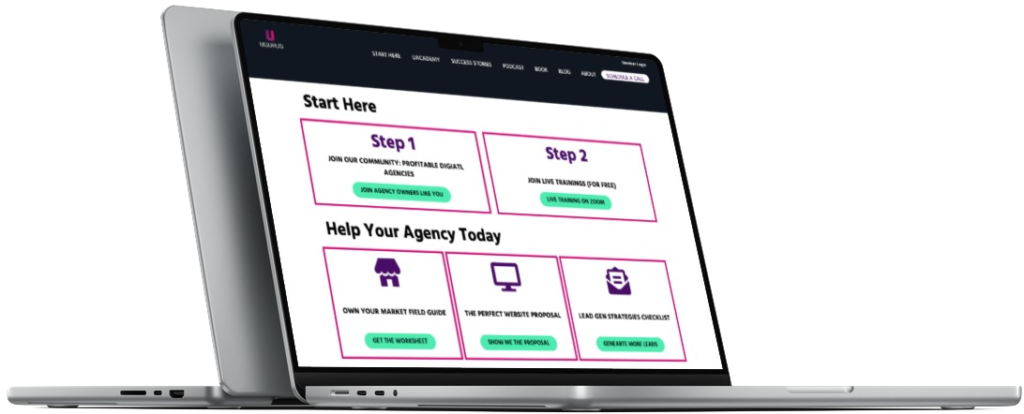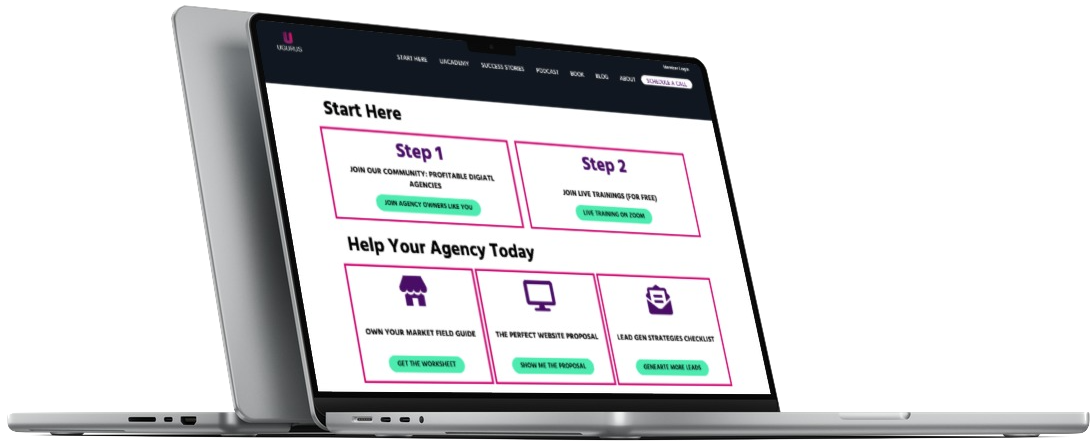I remember the very day I started my agency, almost 13 years ago. After my employer shuttered and laid all of us off during the dot-com bust, I decided to avoid the challenge of finding new employment by starting my own company. I had created a sweet logo, deployed a cool website, printed some sick folding business cards, and positioned everything in my home office just right.
Everything was in place for my new business–except one thing. New business.
I had always been great at organizing and doing, but I had no experience with selling. So, I pretty much sat there, tweaking my website, admiring my business cards, repositioning things on my desk, and waiting for someone to call me.
I’ve talked on uGurus before about my journey from sitting at that desk to turning it into the largest interactive agency in the Rocky Mountain region, so I won’t revisit that in detail today. Instead, I want to use all of the experience I learned from that journey to teach you how to get things moving much faster than I did. Generating the initial client base for your freelance venture or small agency can be scary, but if you employ a few simple tactics, it can be much easier than you might think–even for non-sales gurus like me.
Tactic 1: Consider “Hiring” a Salesperson
I know I said I’d sidestep the detail of how I worked my way out of the home-based office, but I should at least make it clear that I didn’t suddenly figure out how to cold call. Instead, I asked my girlfriend, who was an IT recruiter at the time, to help out (she was the best cold caller I’ve ever met, even to this day). Understanding that sales is a dead-simple numbers game, she picked up a regional business journal, identified several articles about businesses that were having success, and called each of them to offer her congratulations–and offer my services. Within a matter of days, we were contracted to design and build a website for a sprawling resort-living community in Denver. That was the last day I ever remember having an open schedule… from that point on, we were slammed with business.
If you are (or want to be) a multi-person agency, consider joining forces with a salesperson instead of another designer or developer. The additional business you’ll generate will help you add staff much sooner.
You may be saying, “Phil, if I had the money to hire a salesperson, I wouldn’t be reading a post on how to generate business.” Well, you have a couple options for forming a business relationship with a salesperson. You can become equity partners, allowing both you and your new partner to be invested in the potential sacrifice of low upfront compensation with the promise of a big payoff down the road. Or, you could offer someone (or multiple people) a flat commission/finder’s-fee for any work they close or send your way, keeping your financial risk extremely low (more on this tactic coming up).
If you have some financial backing, you could hire someone to do sales for you, whether on a contract basis or as a full-time employee, but even with funding, this will require a willingness to accept a lot of financial risk. If that person doesn’t get clients in the door quickly, you’ll become intimately familiar with the term “burn rate.”
Tactic 2: Find Agency Partners Instead of Clients
In our early years, this was one of my best-kept sales secrets, and it still produces a large portion of our business today.
Clients can be tricky. First, you have to find them. Then you have to guide them through a lengthy design/development process that can be very confusing to them. And once you manage to launch a website, you get to start all over with a new client. If you’re not a motivated sales guru, the never-ending process can be soul-destroying.
Now consider a scenario where you work with a partner agency that outsources parts of their client projects to you. These agencies tend to have many projects in process, which may mean you can start billable work immediately, instead of waiting on your own sales cycle. Partner agencies already understand how the web design/development process works (much more than the typical client, anyway). Once you have the relationship, they bring the opportunities to you. And as you continue to learn all the little things about working together, each project you complete tends to go more smoothly than the last.
Does this model lack the glamor of direct client work? Maybe. Does it prevent you from building a strong portfolio of work that can be featured on your website? Sometimes. Can it provide a much more immediate, consistent, and profitable revenue stream than the feast-or-famine nature of client work? Definitely.
It can be true that finding an agency partner can be just as much work as finding a client. However, we’ve always found a higher success rate with the former because:
- Many agencies still lack strong internal web capabilities. They need you.
- Agencies are more logical than non-technical clients, making it easier to close a deal without strong sales skills. You just need to show them 1) that you understand their needs, 2) that you have the expertise to solve their problem and, most importantly, 3) that you understand how to be a good partner, even if it means being invisible to their clients.
- It’s a one-time sell. Once you form the relationship, you don’t ever have to cold call them again. Do great work at a reasonable price, and they’ll stick with you for a long time.
- You don’t even need to cold-call these agencies. In fact, we’ve had better luck just emailing and snail-mailing portfolios with a short letter that explains how we can help them look good to their clients. If you create a good letter, get it to 100 agencies, and get responses from 5 of them, you might get a solid, long-term revenue source out of the 1 or 2-day effort.
Tactic 3: Build a Real Referral Program
Referral programs don’t usually perform well, but that’s because they’re typically poorly executed. Even though they can take longer to start generating results, they can be one of the most effective revenue streams in your arsenal.
The main reasons most agencies’ referral programs fail are:
- They are poorly marketed. If you can’t or don’t adequately explain the potential benefits to enough of the right people, nobody is going to refer business.
- The rewards don’t seem real. We all see referral program invitations every day, whether it’s an apartment community offering you $400 for any new resident you bring in, or a financial advisor offering a $50 Starbucks card in exchange for a new client consultation. We brush most of these aside because we can’t think of anyone to refer off the top of our heads. And once we throw the invitation in the trash, we never think about it again.
A good referral program will overcome these issues by setting participants up to be successful and making them believe they can be successful. By following these guidelines, we’ve paid out over $1M in commissions in 13 years.
The first thing you need to do is establish your program rewards. How much are you willing to pay for each lead? Will it be a fixed amount or a percentage of the total deal value? What items are exempt from the commission? (You probably don’t want to pay commissions on fees that are being passed to another company, such as hosting, video production, ad buys, etc.) When will you pay commissions? Will you also pay out on follow-on work or just the initial project?
Next, communicate your program to as many people as possible. Maybe even everyone in your contacts. Remember that they may not know how much you charge for your work, so give them some enticing examples of how much they could make for very little effort. If you’re paying a 10% commission, and you’re building websites that average $10,000, focus on that $1,000 check you’ll be putting in their hands.
Then, create a workflow for keeping your “referral agents” updated on their results. There’s nothing worse than sending three leads to a company and never knowing whether or not they resulted in a phone call, meeting, or deal.
You can use a robust and pricey 3rd-party referral tracking software system, build a password-protected referral portal like we have, or just share a spreadsheet with each agent. Regardless, you absolutely must let them know every time you hear from a lead or make progress on a deal. Seeing these results will keep your program front-of-mind for your agents and motivate them to keep working for you.
Finally, remember that the more you pay in commissions, the more successful you’ll be. Unlike other costs in your business, this is one that you never want to minimize. Low commission payments equal low revenue. High commission payments equal high revenue. The first time an agent gets a $1,200 check for doing little more than passing along your business card, you’ll have a true evangelist.
Make no mistake–if you get 100 people interested in your program, you may only get a referral from one of them. But it’s an easy numbers game to play, with no real salesmanship required beyond making them believe in the income potential.
Keep Performing Within Your Comfort Zone
I highly recommend honing your sales skills, whether you plan to become a sales guru or not. But, it can be a long, challenging road. The tactics I’ve outlined here can help you to generate recurring business even prior to becoming a closer. It’s all about understanding where you can offer value, casting a wide net, and letting other people compensate where your skills are lacking. While “sales” can be scary to non-sales people, “generating business” is something that we’re all capable of.
GET YOUR FREE AGENCY ACCELERATOR PACKAGE





